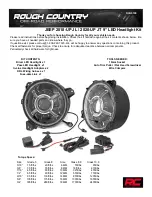
To Install:
1. Install the gasket onto the power vacuum brake booster.
2. For 2002 through 2004 vehicles, attach the power vacuum brake booster to the
vehicle. Torque the mounting nuts to
30 ft-lb (40 Nm)
.
3. For 2005 through 2007 vehicles, attach the power vacuum brake booster to the
vehicle. Torque the mounting nuts to
27 ft-lb (36 Nm)
.
4. Install the stop lamp switch and pushrod onto the brake pedal pin.
5. Connect the pushrod retainer to the brake pedal pin.
6. Install the left insulator panel under the instrument panel (I/P).
7. Install the power vacuum brake booster hose onto the power vacuum brake
booster and the engine.
8. Install the master cylinder assembly onto the power vacuum brake booster.
Testing
Vacuum Leak Test
1. Operate the engine at idle without touching the brake pedal for at least one minute.
2. Turn off the engine and wait one minute.
3. Test for the presence of assist vacuum by depressing the brake pedal and
releasing it several times. If vacuum is present in the system, light application will
produce less and less pedal travel. If there is no vacuum, air is leaking into the
system.
System Operation Test
1. With the engine
OFF
, pump the brake pedal until the supply vacuum is entirely
gone.
2. Put light, steady pressure on the brake pedal.
3. Start the engine and let it idle. If the system is operating correctly, the brake pedal
should fall toward the floor if the constant pressure is maintained.
Brake Fluid
Bleeding the Brake System (Non ABS)
1. Clean all dirt from around the master cylinder fill cap, remove the cap and fill the
master cylinder with brake fluid until the level is within 1/4 in. (6mm) of the top edge
of the reservoir.
2. Clean the bleeder screws at all 4 wheels. The bleeder screws are located on the
top of the brake calipers.
3. Attach a length of rubber hose over the bleeder screw and place the other end of
the hose in a glass jar, submerged in brake fluid.
4. Starting at the right rear proceed in this order left front, left rear and right front.
5. Open the bleeder screw 1/2 - 3/4 turn. Have an assistant slowly depress the brake
pedal.
6. Close the bleeder screw and tell your assistant to allow the brake pedal to return
slowly. Continue this process to purge all air from the system.
Summary of Contents for TrailBlazer
Page 1: ......
Page 26: ...Fig 3 Typical body and undervehicle maintenance locations Refer to chart for descriptions ...
Page 29: ......
Page 30: ......
Page 31: ......
Page 175: ...Spring free length check Valve spring squareness check ...
Page 192: ...Front of piston mark ...
Page 361: ...5 3L Engine Except Saab Underhood Fuse Block 2003 2005 Early Production ...
Page 469: ...Removing the outer band from the CV boot Removing the inner band from the CV boot ...
Page 470: ...Removing the CV boot from the joint housing Clean the CV joint housing prior to removing boot ...
Page 471: ...Removing the CV joint housing assembly Removing the CV joint ...
Page 472: ...Inspecting the CV joint housing Removing the CV joint outer snap ring ...
Page 473: ...Checking the CV joint snap ring for wear CV joint snap ring typical ...
Page 474: ...Removing the CV joint assembly Removing the CV joint inner snap ring ...
Page 475: ...Installing the CV joint assembly typical ...
Page 553: ...9 Torque the lug nuts to specification 10 Lower the vehicle ...
Page 556: ...Toe in Frame Misalignment Frame misalignment ...
Page 588: ...Bleeding caliper ...
Page 624: ...Manifold gauge set components Refrigerant recovery recycling station ...
Page 676: ...A C Specifications ...
Page 677: ......
















































